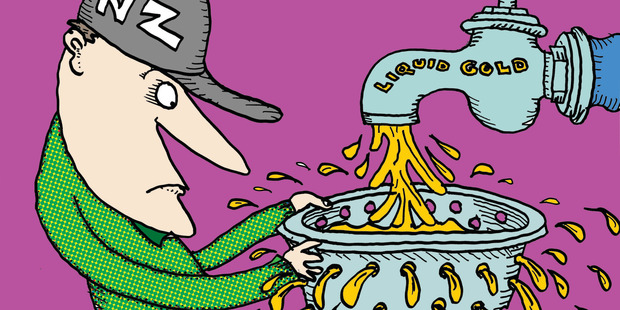Wednesday Apr 27, 2016

Unlike milk, the water trade is booming and nature has given us a ringside seat. Illustration / Peter Bromhead
Given our pluvial climate, New Zealand’s not going to run short of water any time soon because of a growing taste in China for the stuff.
Of the 145 million litres per person that rains down on us each year, 98.2 per cent flows out to the sea unused. Of the 1.8 per cent we do use, around half goes to irrigation, 23 per cent to industry, 17 per cent goes for drinking and 7 per cent to cows and other stock.
Environment Minister Nick Smith says water extracted for bottling is only 0.004 per cent of the resource.
In other words, we’re awash with water, compared, for example, with Australia’s 22 million litres per person and China and Britain’s piddling 2 million litres each. Water wise, we’re the Saudi Arabians of the South Seas. Better, really, because unlike the Sheiks, our liquid gold renews itself annually.
As an export, it has the potential to be as close as you’re likely to find to the fabled perpetual motion money-making machine. Stick a pipe in the ground, bottle it as it gushes out, stick a fancy label on it, name a price and pocket the proceeds. Well, anywhere but New Zealand, it seems, where we’re so stupidly country bumpkinish that we are happy to give it away to any smooth-talking foreigner in a smart suit.
As Winston Peters argues, instead of the present system of local government granting long-term extraction permits to first comers at peppercorn rates, the least the Government should be doing is introducing a royalty payment on the water as it does for other minerals. This income could then be pumped back into the public coffers to help rehabilitate the resource, accelerating the clean-up of vast stretches of the rivers, lakes and aquifers that decades of bad farming and other land exploitation have rendered dangerous to drink from or swim in.
The issue hit the headlines lately with news that Chinese company Oravida pays about $500 a year for the right to draw up to 146 million litres a year from an aquifer in the Bay of Plenty and that in Ashburton, an unknown overseas company has got a 30-year consent to draw 40 billion litres of artesian water over the next 30 years. The council refuses to reveal how much it charged.
A quick trip to Alibaba.com, the Chinese on-line trading site, set up by Prime Minister John Key’s new best mate, billionaire Jack Ma, offers a variety of New Zealand water for sale. Message Jesse Ball, for instance, and you can order “some of the purest water you can drink” from, of all places, Waiheke Island. Available in 1.5 litre plastic bottles or in bulk, “ONLY WATER” comes from “a small, GE-free island, 17.7km off Auckland”. Sourced from the Tawaipareira Creek aquifer, 65m below ground, the water is naturally filtered underground through rock and sand, then mechanically “filtered for extra clarity …”
Then there’s Kiwi Water, confusingly sourced from “the world’s deepest New Zealand aquifers in the Central North Island”. It takes 50 to 100 years to surface at Blue Spring. We learn that “pure water is blue because it absorbs red light, leaving only blue, and some green light, to meet the eye”.
My favourite is “My Water, my health”, also drawn “from one of the world’s deepest aquifers” in Whakatane. It’s a medical chest in a plastic bottle. It contains silica, which repairs tissue and strengthens hair and nails, bicarbonate to balance your pH, sulphate to detoxify your liver, sodium to replenish muscles, potassium “for muscle health and vitality” and calcium for bone health, to assist in nerve and muscle impulses, skin allergies and blood clotting. Last but not least is the magnesium which reduces the risk of heart attacks, headaches and dizziness!
Snake oil or not, it’s our snake oil and we South Seas Arabs should be clipping the ticket.
In 2012, 288 billion litres of bottled water was sold worldwide. By 2020, Transparency Market Research is predicting sales heading for 465 billion litres, worth $384 billion.
Unlike milk, the water trade is booming and nature has given us a ringside seat. Just because we’re awash with the stuff, why give it away?
